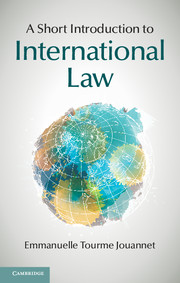3 - International law as an instrument of regulation and social intervention
Published online by Cambridge University Press: 05 February 2015
Summary
We have seen that international law is a historical culture, which arose from European thought and has been disseminated worldwide. We have also seen that nowadays it forms a legal order open to transformations that break up the classical categories into which it used to be arranged, casting doubt on its very existence as an order and creating an identity crisis. It remains for us therefore to consider international law in terms of its purposes and its main areas of application. Like any other system of law, international law is ordered around certain purposes which are its reason for being. Like most national systems in today’s societies, international law aims to achieve these purposes by exercising increasingly diverse functions, which go beyond its primordial and classical function of regulating conduct and managing conflicts. Without being able to list all of those functions in the framework of this book, I would like above all to show that it has become a law of regulation and intervention, and that in this double objective, which has been conferred on it by its social environment, lies one of the main explanations for the changes underway. This is what shall be outlined first (section I) before studying what today seem to be the three fundamental pillars of its area of regulation and intervention, namely peace (section II), development (section III) and human rights (section IV).
End-purposes
To say that contemporary international law is about both regulation and intervention means that it has become a fully liberal-welfarist law. Contemporary international law obeys a double liberal and welfarist purpose, which to a large extent explains its current extension into a regulatory and interventionist form. It is used both to manage problems of peace, coexistence and cooperation among states, and also to safeguard the well-being of the world’s population. Its objective is to govern the world of states and international actors, but also the lives of individuals and peoples, their rights and freedoms, their health and their education. It has not just a role of regulating international relations but it is also an instrument for intervening within national societies and international society. The one explaining the other, it is these purposes/functions of international law that explain the developments observed in Chapter 2. These functions emerged and expanded with the new international context when international society became a post-colonial and post-Cold War society.
- Type
- Chapter
- Information
- A Short Introduction to International Law , pp. 64 - 113Publisher: Cambridge University PressPrint publication year: 2014



